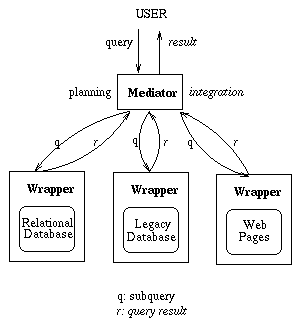


Run this PERL script to display the environment variables and values available to a CGI script.
See the PERL script.
GET: the query string sent is placed in the environment variable QUERY_STRING
for CGI script to process.
POST: the query string is sent by a separate stream and becomes the
standard input to the CGI script.
Note: when POST is used, the environment variables are set:
CONTENT_LENGTH, CONTENT_TYPE.
<Form method=POST action="full_path_name/cgi-bin/club.cgi">
Your name: <input type="text" name="name" size="30"><br>
Address: <input type="text" name="address" size="50"><br>
Tel. No: <input type="text" name="tel" size="30"><br>
Fax: <input type="text" name="fax" size="30"><br>
Email: <input type="text" name="email" size="30"><br>
Private message to host:<br>
<textarea name="comm1" rows=5 cols=40></textarea><p>
E-mail message to all members (also posted on bulletin board) :<br>
<textarea name="comm2" rows=5 cols=40></textarea><p>
Message posted on bulletin board only:
<br> <textarea name="comm3" rows=5 cols=40></textarea><p>
<input TYPE="submit" VALUE="Submit"><input TYPE="reset" VALUE="Erase">
In the above, you need to replace full_path_name to where the cgi-bin is actually located. The cgi program is called club.cgi and it is in cgi-bin. It looks like this:
#!/usr/local/bin/perl
# The first line should be where perl resides on the local system.
$company = "company-name\@cs.pitt.edu";
$webmaster = "webmaster-name\@cs.pitt.edu";
# You can have a list of e-mail addresses in the memberlist.
$memberlist = "member-name\@cs.pitt.edu";
($sec,$min,$hour,$mday,$mon,$year,$wday,$yday,$isdst)
= localtime(time);
$mon = $mon + 1;
if ($ENV{'REQUEST_METHOD'} eq 'POST') {
# Get the input
read(STDIN, $buffer, $ENV{'CONTENT_LENGTH'});
# Split the name-value pairs
@pairs = split(/&/, $buffer);
# Load the FORM variables
foreach $pair (@pairs) {
($name, $value) = split(/=/, $pair);
$value =~ tr/+/ /;
$value =~ s/%([a-fA-F0-9][a-fA-F0-9])/pack("C", hex($1))/eg;
$FORM{$name} = $value;
}
# Open the email message to send the data to webmaster
if($FORM{comm1} ne "") {
open (MESSAGE, "| /usr/bin/mail $webmaster ");
# The mail utility is in /usr/bin/mail so you need to change that if different.
# Format email header information
print MESSAGE "To: $company\n";
if ($FORM{email} ne "") {
print MESSAGE "Reply-To: $FORM{email}\n";
}
# Write the actual email message
print MESSAGE "Subject: Message from $ENV{'REMOTE_HOST'}\n\n";
print MESSAGE "Name: $FORM{name}\n";
print MESSAGE "Address: $FORM{address}\n";
print MESSAGE "Telephone: $FORM{tel}\n";
print MESSAGE "Fax: $FORM{fax}\n";
print MESSAGE "Email: $FORM{email}\n";
print MESSAGE "Message to Host: $FORM{comm1}\n";
close (MESSAGE);
}
# Open the email message to send the data to a list of members
if($FORM{comm2} ne "") {
open (MESSAGE, "| /usr/bin/mail $memberlist ");
# Format email header information
print MESSAGE "To: $company\n";
if ($FORM{email} ne "") {
print MESSAGE "Reply-To: $FORM{email}\n";
}
# Write the actual email message
print MESSAGE "Subject: Message from $ENV{'REMOTE_HOST'}\n\n";
print MESSAGE "Name: $FORM{name}\n";
print MESSAGE "Address: $FORM{address}\n";
print MESSAGE "Telephone: $FORM{tel}\n";
print MESSAGE "Fax: $FORM{fax}\n";
print MESSAGE "Email: $FORM{email}\n";
print MESSAGE "Message to All: $FORM{comm2}\n";
close (MESSAGE);
# Also post this message
# You need to change the full_path_name.
open (MESSAGE, "> /full_path_name/t1");
print MESSAGE "<p>\n";
print MESSAGE "<b> Message from $ENV{'REMOTE_HOST'}</b><br>";
print MESSAGE "<b> Name</b>: $FORM{name}<br>";
print MESSAGE "<b> Email</b>: $FORM{email}<br>";
print MESSAGE "<b> Time/Date</b>:$hour:$min:$sec / $mon-$mday-$year,<br>";
print MESSAGE "<b>Posted Message</b>: $FORM{comm2}<br>";
close (MESSAGE);
# The bulletin bu.html and two temporary files t1 and t2, are in local directory.
# We use local files t1 and t2 so that a new message appears at the top of bulletin.
$ans=`cat /full_path_name/t1 /full_path_name/bu.html > /full_path_name/t2`;
$ans=`cp /full_path_name/t2 /full_path_name/bu.html`;
}
# Post message to the bulletin board only
if( $FORM{comm3} ne "") {
open (MESSAGE, "> /full_path_name/t1");
print MESSAGE "<p>\n";
print MESSAGE "<b> Message from $ENV{'REMOTE_HOST'}</b><br>";
print MESSAGE "<b> Name</b>: $FORM{name}<br>";
print MESSAGE "<b> Email</b>: $FORM{email}<br>";
print MESSAGE "<b> Time/Date</b>:$hour:$min:$sec / $mon-$mday-$year,<br>";
print MESSAGE "<b>Posted Message</b>: $FORM{comm3}<br>";
close (MESSAGE);
$ans=`cat /full_path_name/t1 /full_path_name/bu.html > /full_path_name/t2`;
$ans=`cp /full_path_name/t2 /full_path_name/bu.html`;
}
# Thank the user and acknowledge the order
&thank_you;
}
else {
# Format an error message for the user
print "Content-type: text/html\n\n";
print "<HTML>\n";
print "<HEAD>\n";
print "<TITLE>Message Form Error</TITLE>\n";
print "</HEAD>\n";
print "<BODY>\n";
print "<H1>Message Form Error</H1>\n";
print "<HR>\n";
print "<P>\n";
print "Form input was not processed. Please mail your ";
print "remarks to $company\n";
print "</BODY>\n";
print "</HTML>\n";
}
sub thank_you {
print "Content-type: text/html\n\n";
print "<HTML>\n";
print "<HEAD>\n";
print "<TITLE>Thank You</TITLE>\n";
print "</HEAD>\n";
print "<BODY>\n";
print "<H1>Thank You</H1>\n";
print "<HR>\n";
print "<P>\n";
print "Your message have been emailed to host, or emailed to other members, or posted on the bulletin board.\n";
print "</BODY>\n";
print "</HTML>\n";
}
<Form Method = "post" action = "cgi-bin/hello.cgi"> Input your name here: <Input Type="text" Name = "your_name" size=20 value=""> <Input Type="submit" value="submit"> </Form>
#!/bin/sh -f
# When the request method is POST,
# read the query string from the standard input.
read string
echo Content-type: text/html
echo ""
echo query string: $string
echo "<p>"
echo $string | awk -F= '{print "Hello", $2, "!"}' | sed 's/+/ /'
<Form method=GET action="cgi-bin/club.cgi">
Your name: <input type="text" name="name" size="30"><br>
Address: <input type="text" name="address" size="50"><br>
Tel. No: <input type="text" name="tel" size="30"><br>
Fax: <input type="text" name="fax" size="30"><br>
Email: <input type="text" name="email" size="30"><br>
<input TYPE="submit" VALUE="Submit">
<input TYPE="reset" VALUE="Erase">
<Form>
what you see in the browser is:
The CGI script ind_info.cgi looks like this:
#include <stdio.h>
#include <stdlib.h>
/*from cgi2env.c*/
extern void cgi2env();
extern void http_head();
main()
{
char *val;
/* split Name-Value pairs into environment variables WWW_Name */
cgi2env();
http_head(); /* output header "Content-type: text/html\n\n" */
val = getenv("WWW_name");
printf("name = %s <br>\n", val);
val = getenv("WWW_address");
printf("address= %s <br>\n", val);
val = getenv("WWW_tel");
printf("telphone = %s <br>\n", val);
val = getenv("WWW_fax");
printf("fax = %s <br>\n", val);
val = getenv("WWW_email");
printf("email = %s <br>\n", val);
}
Wrappers accept one input query and convert it into one or more queries/commands understandable by the encapsulated data source, and transform the native query results into a format understood by the mediator. The mediator thereby integrates these results and returns it to the user.
The figure below illustrates a mediator system in which data sources could be relational databases, object-oriented databases, legacy databases, web sites and so on.
